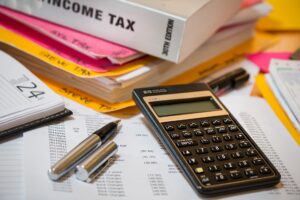Bankruptcy timing can affect not only whether you must pay a tax debt but also whether you must pay certain tax interest and penalties.

This blog post is in a series about the importance of smart timing of your bankruptcy filing. Today we cover how good bankruptcy timing can prevent you from having to pay certain income tax interest and penalties.
Avoiding Income Tax Interest and Penalties by Discharging the Tax Itself
Two weeks ago we discussed how to time a Chapter 7 “straight bankruptcy” appropriately to discharge an income tax debt. “Discharge” means to legally, permanently write off the tax. Then last week we discussed how to discharge an income tax in a Chapter 13 “adjustment of debts” case. When you discharge a tax in these ways what happens to the interest and penalties tied to that tax?
Generally, if you discharge an income tax debt, that also discharges any interest and penalties associated with that tax. That’s the most straightforward way to avoid such tax interest and penalties.
What If the Tax Does Not Qualify for Discharge?
If your tax debt doesn’t meet the timing and other conditions for discharge, what happens to the interest and penalties? That depends on whether you (with the help of your Kalispell bankruptcy lawyer) file a Chapter 7 or Chapter 13 case.
Interest and Penalties on Nondischargeable Tax under Chapter 7
If you file a Chapter 7 bankruptcy you continue to owe the tax, and the interest and taxes keep accumulating.
You do receive one brief benefit. During the 3-4 months of the bankruptcy procedure, the IRS and/or state legally may not collect the tax. The “automatic stay” that stops just about all debt collection activity applies to all your income tax debts. But as soon as the Chapter 7 case is done, the tax collection activity can resume. The interest and penalties continue to accumulate even during your case. And after the case, they will continue accumulating as normal until you pay the tax, interest, and penalties in full. So with taxes that don’t qualify for discharge, Chapter 7 does not help with tax interest and penalties.
Interest and Penalties on Nondischargeable Tax under Chapter 13
However, if you file a Chapter 13 case there is some help with tax interest and penalties. This can be true even with a nondischargeable income tax.
In most Chapter 13 cases you do not have to pay any ongoing interest and penalties after filing your case. Through your payment plan, you pay the tax over the 3-to-5-year life of your case. But the IRS/state writes off any after-filing accumulating interest and penalties as long as you successfully complete your case. (If you don’t complete your case, the IRS/state tacks on any accumulating interest and penalties to whatever tax you didn’t pay.)
What about the before-Chapter-13-filing interest and penalties? You must pay the interest portion along with the nondischargeable tax that you have to pay.
However, you usually don’t have to pay the before-bankruptcy-filing penalty portion in full. Sometimes you don’t have to pay any of it. The tax penalties are a “general unsecured” debt. You generally pay general unsecured debts only as much as you can afford to pay during the life of your Chapter 13 case. This means that you may pay as little as none of the pre-bankruptcy penalties.
Furthermore, in most cases, these penalties don’t add a dime to the amount you must pay into your Chapter 13 case. That’s because in most cases you pay what you can afford into the pool of general unsecured debts over the life of your payment plan. A set amount filters down to these debts. So the dollar amount of tax penalties merely reduces how much other general unsecured debts receive. You don’t pay any more. The amount you pay just gets shifted around among these debts.
Exceptions
There are exceptions to the above. Sometimes the amount you pay into your payment plan is driven less by your budget than by non-exempt (unprotected) assets. Then you may need to pay more to your general unsecured debts (which includes the pre-bankruptcy penalties). You may even need to pay them in full—a so-called 100% plan. But that’s rare. Your bankruptcy lawyer will discuss this with you if you have this unusual situation.
What about the Effect of a Recorded Income Tax Lien?
That’s a great question. The recording of an income tax lien before filing a bankruptcy case can definitely create additional headaches for you. This can be true about both the underlying tax itself and the related interest and penalties.
So the simple timing preference is, when possible, file your bankruptcy case before the IRS/state records a tax lien.
The effect of a tax lien depends on whether the tax at issue qualifies for discharge, and whether you file a Chapter 7 or 13. We’ll cover these in our blog post next week.


